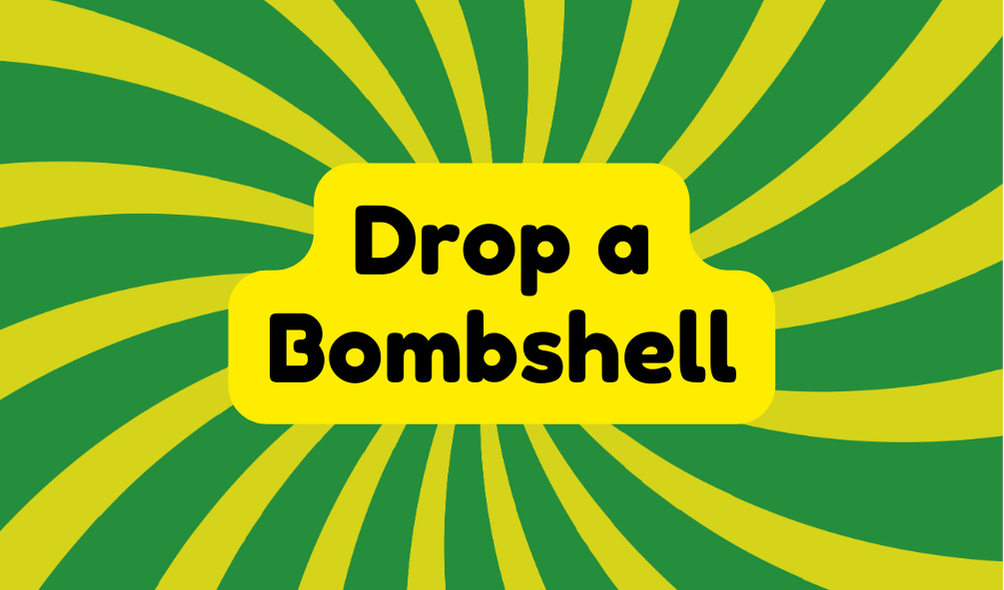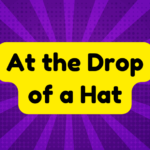The phrase "drop a bombshell" refers to delivering surprising news that disrupts typical expectations. Its origins trace back to World War I, where it represented the chaos from aerial attacks. This vivid imagery evolved into everyday language to signify shocking announcements. Common examples include unexpected life changes or corporate news. The term remains relevant today as it effectively captures societal and emotional reactions to sudden revelations, inviting further exploration into its various applications and implications.
Synonyms
Synonyms for the phrase "drop a bombshell" serve as useful alternatives in various contexts. For example, phrases like "bolt out of the blue" can vividly convey unforeseen news. Readers seeking innovation might find these synonyms particularly enlightening:
- Stun with an announcement – Suggests a shocking revelation that alters expectations.
- Hit like a freight train – Emphasizes the sudden impact of startling announcements.
- Throw a curveball – Highlights the unexpected nature of certain discussions.
Understanding these alternatives helps individuals articulate powerful moments, making their communication more effective while addressing the emotional responses often tied to startling revelations.
Example of Sentences
Dropping a bombshell often elicits strong reactions, not only from the person delivering the news but also from those receiving it. Such shocking announcements can transform conversations and relationships in an instant. For instance, consider these scenarios:
- A student unexpectedly reveals plans to pause education for a job opportunity.
- A friend shares an unexpected revelation about expecting a child, altering future plans.
- An employee learns of their leave application being rejected, causing frustration.
These moments showcase how unforeseen information can disrupt normalcy, forcing individuals to navigate the emotional aftermath and reconsider their next steps.
Origin
The phrase "drop a bombshell" emerges from a historical context that resonates with both shock and disruption. Its military origins trace back to World War I, where the devastating impact of a falling bomb symbolized surprise and chaos. This vivid imagery provides a foundation for understanding its evolution into a metaphor for unexpected announcements or startling news. Post-war, the expression gained traction, reflecting societal sentiments surrounding abrupt revelations that could alter circumstances dramatically. This shift from military vernacular to everyday language underscores the profound effects of shocking disclosures, cementing its role in modern communication as a means of expressing significant surprises.
Collocations
While many may use the phrase "drop a bombshell" in everyday conversation, understanding its common collocations reveals deeper nuances in its application. Importantly, the term often appears alongside phrases that amplify its impact, such as:
- Bombshell announcements – Highlighting significant news that catches people off guard.
- Unexpected revelations – Emphasizing new information that alters perceptions.
- Stunning disclosures – Suggesting information that is both surprising and shocking.
Recognizing these collocations allows for a more thorough use of "drop a bombshell," transforming casual conversations into moments of profound revelation that provoke thought and evoke emotion.
How to Use in Everyday Language
Using the phrase "drop a bombshell" in everyday language can effectively convey the weight of surprising news. It captures the emotional impact often associated with unexpected announcements, making it suitable for a variety of everyday situations. For instance, one could use this expression when revealing major personal decisions, career changes, or relationship developments. While it adds drama, users must be cautious, as overusing it might dilute its significance. Balancing its emotional weight and context is vital. Employing this phrase thoughtfully can enhance conversations and guarantee clarity, but users should remain aware of its potential consequences on the audience's reactions.
Why Is It Still Relevant Today?
Although modern communication often emphasizes positivity and candor, the phrase "drop a bombshell" remains relevant as it captures the essence of unexpected news, highlighting the human tendency to respond to surprises with a mix of curiosity and concern. Its cultural impact lies in how it elicits emotional responses, providing a framework for understanding sudden revelations in personal and professional spheres.
| Context | Emotional Response | Cultural Impact |
|---|---|---|
| Personal Life | Shock and Disbelief | Relational Dynamics |
| Professional News | Anxiety and Concern | Workplace Culture |
| Media Announcements | Curiosity and Intrigue | Public Sentiment |







